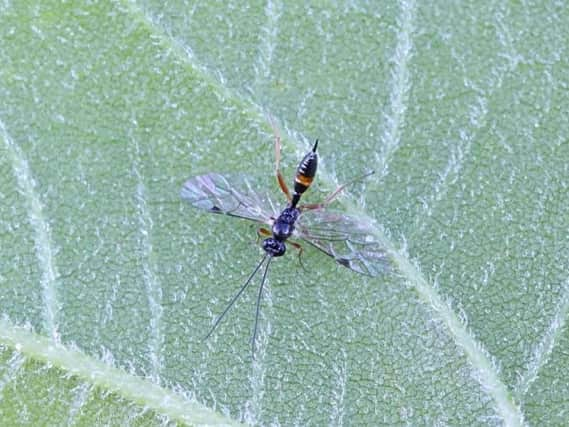Wasp species never seen before in Scotland discovered for the first time


The brightly-coloured Ichneumonid wasp has never been recorded in the country before, but zoology graduate Sam Buckton, who volunteers with the RSPB, made the remarkable discovery in West Dunbartonshire.
Sam, who studied at the University of Cambridge, discovered 315 species considered to be new to the Loch Lomond nature reserve and the area.
He hopes to find more, to bring the total to 500.
Advertisement
Hide AdAdvertisement
Hide AdSam said: "RSPB Scotland's Loch Lomond reserve was acquired relatively recently in 2012, so we still have much to learn about the species that call it home.
"Although the birds and plants on site are well-studied, other groups - particularly invertebrates - are relatively unknown.
"As a large site with a wide array of habitats, Loch Lomond is likely to harbour a huge diversity of species, and the truth is, I've just been scratching the surface with my surveys.
"Most of the new species I've recorded are insects, which are often small and easily overlooked, but I've also found other invertebrates such as gall mites, mosses, liverworts, lichens, parasitic fungi and flowering plants - even large trees.
"Two of my favourite discoveries so far have been the strikingly coloured ichneumonid wasp Ichneumon stramentor and a moth called Brussels lace, an uncommon species which has been confirmed as a county first.
"This challenge has brought home to me the biodiversity that RSPB reserves such as Loch Lomond provide a haven for, and it's also been a lot of fun.
"I'm excited to know what else is out there waiting to be discovered.
"Five hundred species, here we come."
Ichneumonid wasps have been described as the 'terror of the insect kingdom' as they are known to paralise hosts to implant their eggs.
Advertisement
Hide AdAdvertisement
Hide AdMany species, particularly invertebrates, are under-recorded across the UK, but even common wildlife is regularly overlooked.
This means that dramatic declines, such as those seen in recent years with house sparrows and bumblebees, can take time to come to light.
Paula Baker, RSPB Scotland site manager at Loch Lomond, said: "We know that this reserve is a particularly special site for wildlife, not just birds, but across the board.
"We've already uncovered a few rarities through the years, such as spotted crake and the great otter spider, but the more records we have the better, even of relatively common species.
"I think Sam's remarkable, and we actually can't put a value on his work.
"Having records like these will not only help us to manage the reserve better going forwards, but they also give us a baseline to work from in the future, allowing us to monitor species to see how they're being affected by issues such as climate change."